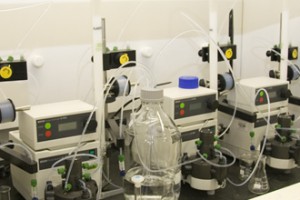Sampling protocols
In this section
1080
Sodium monofluoroacetate (Compound 1080) is a highly water-soluble vertebrate pesticide, used in the control of possums and rabbits. Pest control operations using 1080, particularly the aerial distribution of 1080 baits, are closely monitored by medical officers of health, and in some cases they may specify that samples from waterways close to operational areas are tested for 1080.
Though the likelihood of the general public being exposed to 1080 as the result of pest control operations is considered low, circumstances may arise where people present themselves to their local GP and request a blood test for 1080 exposure.
The risk of potential contamination of New Zealand water supplies by 1080, particularly following aerial application of baits for pest control, has been addressed by research on the environmental effects and degradation of 1080 in water (e.g. Eason et al. 1992, 1993; Ogilvie et al. 1996; Booth et al. 1999; Eason & Wright 2001; Fisher et al. 2003; Suren 2006). Manaaki Whenua – Landcare Research maintains a database of the results of over 2000 water samples tested by the toxicology laboratory for 1080 contamination since 1990.
Employers in the pest control industry are encouraged to undertake the routine (at least annual) monitoring of workers who handle material containing 1080. Urine testing is the preferred method for measuring worker exposure to 1080. In the context of occupational exposure to 1080, the Occupational Safety and Health Service (OSH), Department of Labour, has established the Biological Exposure Index (BEI) at 0.015 µg/mL (ppm).
Vertebrate pesticides in animals
When animals are found dead there may be a requirement to establish the cause of death, especially in situations where non-target species may have been exposed to vertebrate pesticides. Samples can be taken and analysed for a number of vertebrate pesticides to establish a diagnosis of pesticide poisoning.
Vertebrate pesticides are used throughout New Zealand for control of pests such as possums, rabbits, and rodents. There is potential for effects on non-target animals as well as the contamination of waterways, soil, leaf-litter (which is an important habitat for invertebrates), and plants (Spurr & Powlesland 1998).
Manaaki Whenua – Landcare Research maintains a national database of vertebrate pesticide residue test results, from samples of plants, soil and animal tissue and corresponding background information submitted to its Toxicology Laboratory at Lincoln.
